人教版八年级下册Unit3Section B 3a-self check课件(共25张PPT)
文档属性
| 名称 | 人教版八年级下册Unit3Section B 3a-self check课件(共25张PPT) | 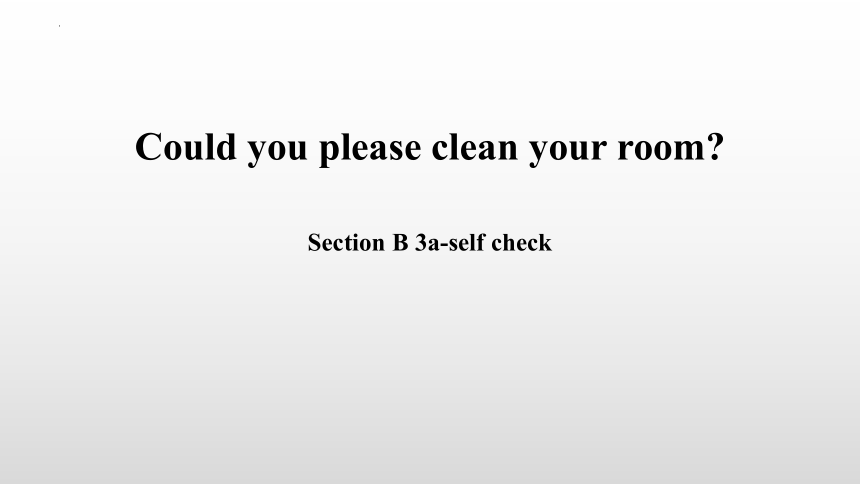 | |
| 格式 | pptx | ||
| 文件大小 | 661.7KB | ||
| 资源类型 | 教案 | ||
| 版本资源 | 人教新目标(Go for it)版 | ||
| 科目 | 英语 | ||
| 更新时间 | 2023-03-29 18:49:45 | ||
图片预览

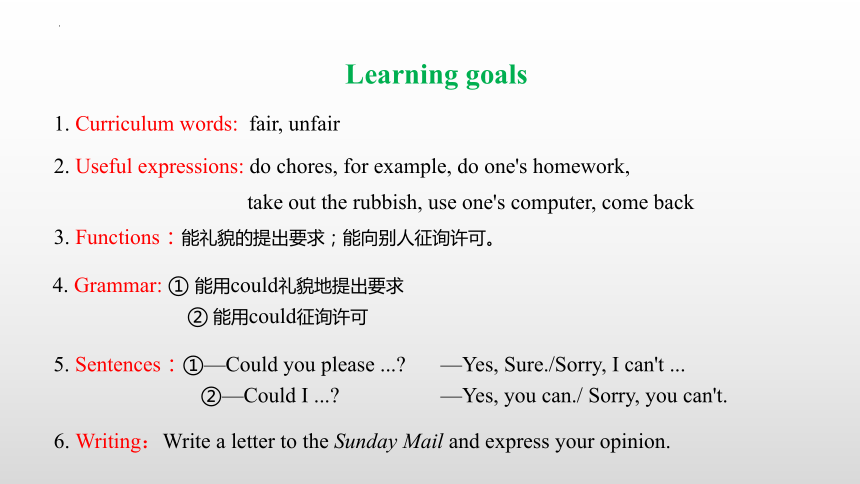

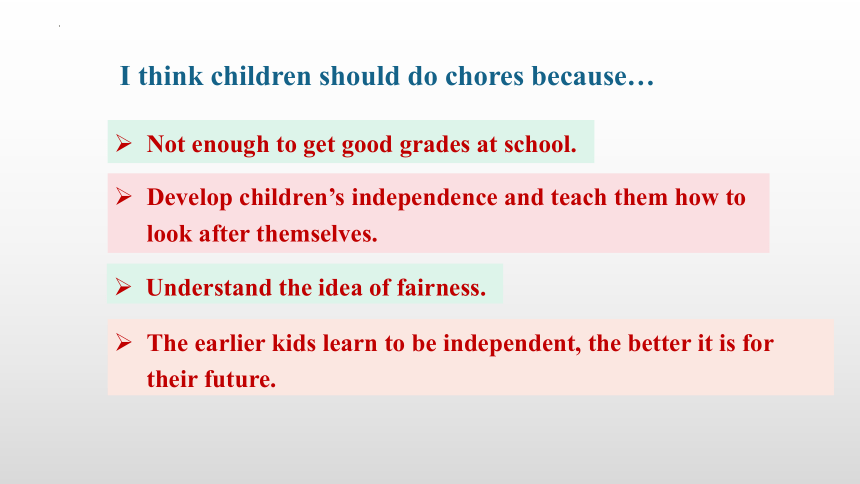
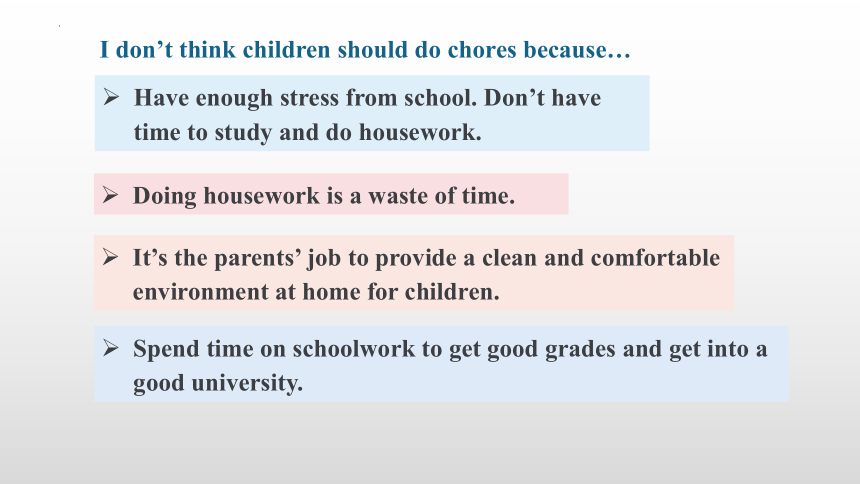
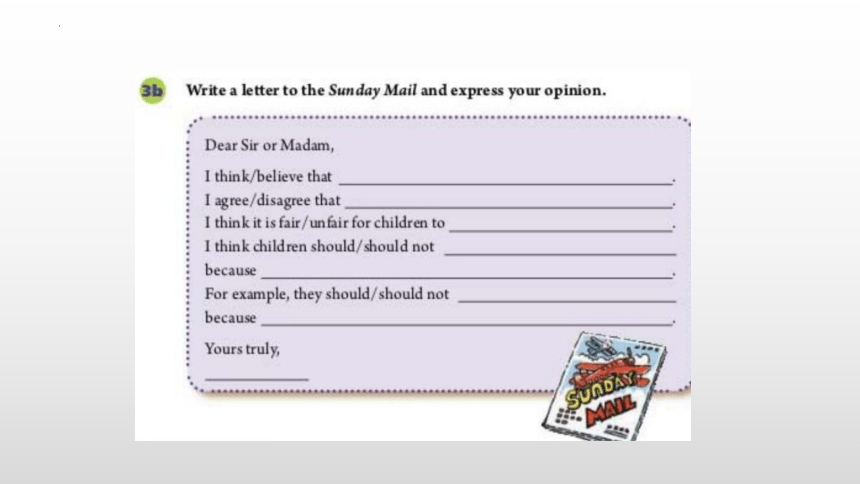
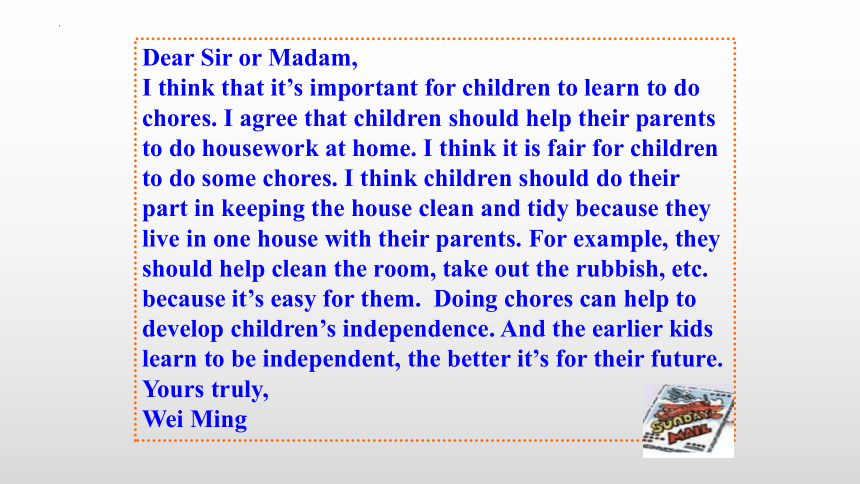
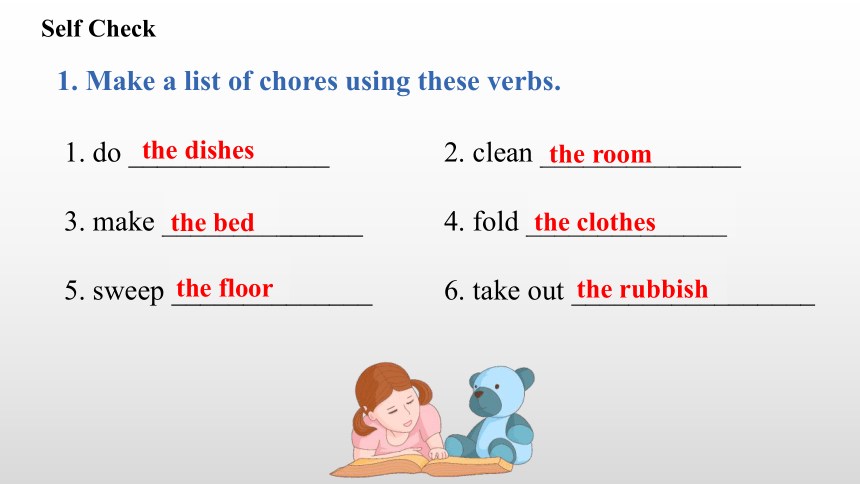
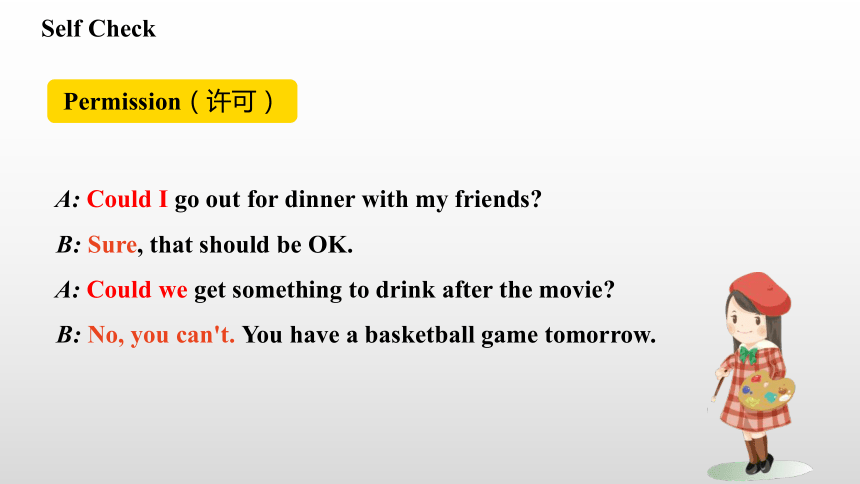
文档简介
(共25张PPT)
Could you please clean your room
Section B 3a-self check
Learning goals
1. Curriculum words: fair, unfair
2. Useful expressions: do chores, for example, do one's homework,
take out the rubbish, use one's computer, come back
6. Writing:Write a letter to the Sunday Mail and express your opinion.
3. Functions:能礼貌的提出要求;能向别人征询许可。
4. Grammar: ① 能用could礼貌地提出要求
② 能用could征询许可
5. Sentences:①—Could you please ... —Yes, Sure./Sorry, I can't ...
②—Could I ... —Yes, you can./ Sorry, you can't.
3a
Do you think children should do some chores at home Why or why not Discuss this with a partner and take notes.
Children should do chores because… Children should not do chores because…
I think children should do chores because…
Not enough to get good grades at school.
Develop children’s independence and teach them how to look after themselves.
Understand the idea of fairness.
The earlier kids learn to be independent, the better it is for their future.
I don’t think children should do chores because…
Have enough stress from school. Don’t have time to study and do housework.
Doing housework is a waste of time.
Spend time on schoolwork to get good grades and get into a good university.
It’s the parents’ job to provide a clean and comfortable environment at home for children.
Dear Sir or Madam,
I think that it’s important for children to learn to do chores. I agree that children should help their parents to do housework at home. I think it is fair for children to do some chores. I think children should do their part in keeping the house clean and tidy because they live in one house with their parents. For example, they should help clean the room, take out the rubbish, etc. because it’s easy for them. Doing chores can help to develop children’s independence. And the earlier kids learn to be independent, the better it’s for their future.
Yours truly,
Wei Ming
1. do ______________ 2. clean ______________
3. make ______________ 4. fold ______________
5. sweep ______________ 6. take out _________________
1. Make a list of chores using these verbs.
Self Check
the dishes
the room
the bed
the clothes
the floor
the rubbish
Permission(许可)
A: Could I go out for dinner with my friends
B: Sure, that should be OK.
A: Could we get something to drink after the movie
B: No, you can't. You have a basketball game tomorrow.
Self Check
Requests(请求)
A: Could you please take out the rubbish
B: OK, but I want to watch one show first.
A: Could you please take the dog for a walk
B: Yes, sure.
Self Check
2 .Are these polite requests or permissions Write
the numbers in the correct places in the chart.
1. Could you please do your homework
2. Could I watch TV
3. Could you take out the rubbish first
4. Could I use your computer
5. Could I leave now
6. Could you come back before nine
Requests Permission
2
4
5
1
3
6
Use the questions in activity 2 to write a conversation.
A: _______________________
B: _______________________
…
1. waste
n. 浪费;垃圾
v. 浪费;滥用
Don’t throw waste everywhere. 不要到处扔垃圾。
Don’t waste water. 不要浪费水。
waste还可以作形容词,意为“无用的;浪费的;荒芜的”。
A factory is pouring waste water into the river.
一家工厂正向河里倾倒废水。
重点探究
2. It is the parents’ job to provide a clean and comfortable environment at home for their children.
provide
V. 提供;供应
provide sb. with sth=provide sth. for sb.
意为“为某人提供某物”。
They provided him with money and clothes.
They provided money and clothes for him.
他们提供给他钱和衣服。
Exercises
一、单项选择
1
—Remember this, children. _____ careful you are, _____ mistakes you will make.
—We know, Mr. Li.
A. The more; the more B. The fewer; the more
C. The more; the fewer D. The less; the less
—I know nothing about the film Titanic.
—_____.
A. Neither do I B. So do I C. Neither did I D. So did I
2
C
A
Exercises
3
In the world, more than 30% of schools do not provide safe drinking water _____ about 570 million children.
with B. for C. towards
—Could I go out for dinner with my friends
—Yes, of course you _____.
A. could B. can C. might D. will
4
B
B
Could you please s ______ the floor
Mr. Smith lives next to my house. We are n_________.
My dad thinks playing computer games is a w______ of time.
She_________ (借) a picture book from the libary last week.
Bob and Jim have been good friends ______ (自从) they joined the same tennis team.
I think it's ______(公正的) of my teacher to make that decision.
Exercises
二、根据句意及首字母或汉语提示完成句子。
1
5
borrowed
since
fair
2
3
4
6
weep
eighbors
aste
Exercises
三、完成句子
迈克一放学回家就开始做饭。
Mike started cooking _____ _____ ____ he got home from school.
现在我的英语相当不错——我在工作中反复用到它。
My English is quite good now — I use it ____ ____ _____ at work.
我帮助妈妈照顾我的小弟弟。
I help my mom _____ _____ ____ my younger brother.
as soon as
1
2
3
all the time
take care of
/the minute that/the moment that
/to look after
How to make requests
1. Could you please do …
2. Could you do…
3. Would you please do…
4. Would you do…
…
Your possible responses:
1. Yes, sure.
2. Of course.
3. No problem.
4. I’d love to.
5. Sorry, I can’t.
6. Sorry, I’d love to. But I…
课堂小结
How to ask for permissions
1. Could I …
2. Can I …
3. May I…
4. Shall I/we …
5. Do you mind if I…
…
Your possible responses:
1. Yes/ Certainly.
2. Yes, please.
3. Of course, you may.
4. I’m sorry, but….
5. You’d better not.
6. No problem.
课堂小结
To check whether they are for requests or for permissions.
For requests A ; For permissions B
1. ___ Could you fold your clothes
2. ___ Do you mind if I open the window
3. ___ Can you help me move into my new house tomorrow
4. ___ Would you please move your car
5. ___ May I borrow your eraser
A
A
A
B
B
用方框中所给词的适当形式填空
1.Could you please _____ your room
2.Jerry’s mom ______the floor every Sunday.
3.Sam’s father is a policeman. He’s busy. So Sam ______ to
do the chores.
4.Look! Dan is _________ the rubbish.
5.Could I ________ your dictionary Mine is at home.
6.Amy doesn’t like _______the dishes.
7.Could you please _______ your bed
8.Lucy can _______ her clothes.
sweeps
has
clean sweep take out make fold have do borrow
taking out
doing
make
fold
clean
borrow
翻译句子
1. ——我能邀请我的朋友参加聚会吗?
——是的,你能。
2.——你能把垃圾倒掉吗?
——是的,当然。
3.对孩子们来说,学会如何照顾自己很重要。
—Could I invite my friends to a party
—Yes, you can.
—Could you please take out the rubbish
—Yes, sure.
It’s important for children to learn how to take care of
themselves.
Could you please clean your room
Section B 3a-self check
Learning goals
1. Curriculum words: fair, unfair
2. Useful expressions: do chores, for example, do one's homework,
take out the rubbish, use one's computer, come back
6. Writing:Write a letter to the Sunday Mail and express your opinion.
3. Functions:能礼貌的提出要求;能向别人征询许可。
4. Grammar: ① 能用could礼貌地提出要求
② 能用could征询许可
5. Sentences:①—Could you please ... —Yes, Sure./Sorry, I can't ...
②—Could I ... —Yes, you can./ Sorry, you can't.
3a
Do you think children should do some chores at home Why or why not Discuss this with a partner and take notes.
Children should do chores because… Children should not do chores because…
I think children should do chores because…
Not enough to get good grades at school.
Develop children’s independence and teach them how to look after themselves.
Understand the idea of fairness.
The earlier kids learn to be independent, the better it is for their future.
I don’t think children should do chores because…
Have enough stress from school. Don’t have time to study and do housework.
Doing housework is a waste of time.
Spend time on schoolwork to get good grades and get into a good university.
It’s the parents’ job to provide a clean and comfortable environment at home for children.
Dear Sir or Madam,
I think that it’s important for children to learn to do chores. I agree that children should help their parents to do housework at home. I think it is fair for children to do some chores. I think children should do their part in keeping the house clean and tidy because they live in one house with their parents. For example, they should help clean the room, take out the rubbish, etc. because it’s easy for them. Doing chores can help to develop children’s independence. And the earlier kids learn to be independent, the better it’s for their future.
Yours truly,
Wei Ming
1. do ______________ 2. clean ______________
3. make ______________ 4. fold ______________
5. sweep ______________ 6. take out _________________
1. Make a list of chores using these verbs.
Self Check
the dishes
the room
the bed
the clothes
the floor
the rubbish
Permission(许可)
A: Could I go out for dinner with my friends
B: Sure, that should be OK.
A: Could we get something to drink after the movie
B: No, you can't. You have a basketball game tomorrow.
Self Check
Requests(请求)
A: Could you please take out the rubbish
B: OK, but I want to watch one show first.
A: Could you please take the dog for a walk
B: Yes, sure.
Self Check
2 .Are these polite requests or permissions Write
the numbers in the correct places in the chart.
1. Could you please do your homework
2. Could I watch TV
3. Could you take out the rubbish first
4. Could I use your computer
5. Could I leave now
6. Could you come back before nine
Requests Permission
2
4
5
1
3
6
Use the questions in activity 2 to write a conversation.
A: _______________________
B: _______________________
…
1. waste
n. 浪费;垃圾
v. 浪费;滥用
Don’t throw waste everywhere. 不要到处扔垃圾。
Don’t waste water. 不要浪费水。
waste还可以作形容词,意为“无用的;浪费的;荒芜的”。
A factory is pouring waste water into the river.
一家工厂正向河里倾倒废水。
重点探究
2. It is the parents’ job to provide a clean and comfortable environment at home for their children.
provide
V. 提供;供应
provide sb. with sth=provide sth. for sb.
意为“为某人提供某物”。
They provided him with money and clothes.
They provided money and clothes for him.
他们提供给他钱和衣服。
Exercises
一、单项选择
1
—Remember this, children. _____ careful you are, _____ mistakes you will make.
—We know, Mr. Li.
A. The more; the more B. The fewer; the more
C. The more; the fewer D. The less; the less
—I know nothing about the film Titanic.
—_____.
A. Neither do I B. So do I C. Neither did I D. So did I
2
C
A
Exercises
3
In the world, more than 30% of schools do not provide safe drinking water _____ about 570 million children.
with B. for C. towards
—Could I go out for dinner with my friends
—Yes, of course you _____.
A. could B. can C. might D. will
4
B
B
Could you please s ______ the floor
Mr. Smith lives next to my house. We are n_________.
My dad thinks playing computer games is a w______ of time.
She_________ (借) a picture book from the libary last week.
Bob and Jim have been good friends ______ (自从) they joined the same tennis team.
I think it's ______(公正的) of my teacher to make that decision.
Exercises
二、根据句意及首字母或汉语提示完成句子。
1
5
borrowed
since
fair
2
3
4
6
weep
eighbors
aste
Exercises
三、完成句子
迈克一放学回家就开始做饭。
Mike started cooking _____ _____ ____ he got home from school.
现在我的英语相当不错——我在工作中反复用到它。
My English is quite good now — I use it ____ ____ _____ at work.
我帮助妈妈照顾我的小弟弟。
I help my mom _____ _____ ____ my younger brother.
as soon as
1
2
3
all the time
take care of
/the minute that/the moment that
/to look after
How to make requests
1. Could you please do …
2. Could you do…
3. Would you please do…
4. Would you do…
…
Your possible responses:
1. Yes, sure.
2. Of course.
3. No problem.
4. I’d love to.
5. Sorry, I can’t.
6. Sorry, I’d love to. But I…
课堂小结
How to ask for permissions
1. Could I …
2. Can I …
3. May I…
4. Shall I/we …
5. Do you mind if I…
…
Your possible responses:
1. Yes/ Certainly.
2. Yes, please.
3. Of course, you may.
4. I’m sorry, but….
5. You’d better not.
6. No problem.
课堂小结
To check whether they are for requests or for permissions.
For requests A ; For permissions B
1. ___ Could you fold your clothes
2. ___ Do you mind if I open the window
3. ___ Can you help me move into my new house tomorrow
4. ___ Would you please move your car
5. ___ May I borrow your eraser
A
A
A
B
B
用方框中所给词的适当形式填空
1.Could you please _____ your room
2.Jerry’s mom ______the floor every Sunday.
3.Sam’s father is a policeman. He’s busy. So Sam ______ to
do the chores.
4.Look! Dan is _________ the rubbish.
5.Could I ________ your dictionary Mine is at home.
6.Amy doesn’t like _______the dishes.
7.Could you please _______ your bed
8.Lucy can _______ her clothes.
sweeps
has
clean sweep take out make fold have do borrow
taking out
doing
make
fold
clean
borrow
翻译句子
1. ——我能邀请我的朋友参加聚会吗?
——是的,你能。
2.——你能把垃圾倒掉吗?
——是的,当然。
3.对孩子们来说,学会如何照顾自己很重要。
—Could I invite my friends to a party
—Yes, you can.
—Could you please take out the rubbish
—Yes, sure.
It’s important for children to learn how to take care of
themselves.
同课章节目录
- Unit 1 What's the matter?
- Section A
- Section B
- Unit 2 I'll help to clean up the city parks.
- Section A
- Section B
- Unit 3 Could you please clean your room?
- Section A
- Section B
- Unit 4 Why don't you talk to your parents?
- Section A
- Section B
- Unit 5 What were you doing when the rainstorm came
- Section A
- Section B
- Review of Units 1-5
- Unit 6 An old man tried to move the mountains.
- Section A
- Section B
- Unit 7 What's the highest mountain in the world?
- Section A
- Section B
- Unit 8 Have you read Treasure Island yet?
- Section A
- Section B
- Unit 9 Have you ever been to a museum?
- Section A
- Section B
- Unit 10 I've had this bike for three years.
- Section A
- Section B
